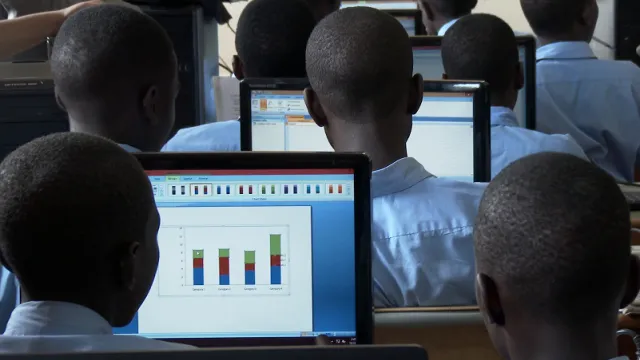Safaricom backed 'Shupavu 291' is revolutionizing education in Kenya, one click at a time

Safaricom backed 'Shupavu 291' is revolutionizing education in Kenya, one click at a time
In the outskirts of Nairobi, Livingstone Mwalish is engrossed in his mobile phone scrolling up and down.
His small home in the informal settlements of Kawangware Nairobi made from corrugated metal is a common sight in the area. But unlike his agemates who spend much of their time in betting kiosks, the form two student at Urban Senior School has a different use for his mobile device.
Read also
- Everyone needs a financial lift at some point
- Over-reliance on rainfall is hurting farmers in Makueni county
As I approached him, I thought the good-humored and lanky young man, just like his mates, was rather listening to some sensational popular tunes.
It was not the case.
Mwalish, however, uses his phone to access locally designed tutorials on different subjects and interactive lessons coupled with assessment tests. On this particular day, the 18-year-old was studying chemistry, a subject that routinely used to give him sleepless nights months ago.
But now, with Shupavu 291 the eLearning platform developed by Eneza Education in partnership with Safaricom, Mwalish has developed a renewed interest in the subject. And he has attained good grades in class to prove it.
“It is now easy to grasp the various concepts. With the platform, I get a lot of time to do follow-up questions and the content is even shortened,” said Mwalish, who was previously limited to a few textbooks his parents could afford before Shupavu 291 happened.
“Because I can now expand my understanding of various concepts apart from what I am taught in class, I have never scored below grade B plain in Chemistry.”
Mobile phone technology has the power to exponentially increase access to quality education; a key pillar of the UN’s Sustainable Development Goals.
Here’s how it got that way.
Initially starting as a pilot project in 2013, the platform has taken on a life of its own and is slowly becoming one of Kenya’s largest e-learning tools bringing together students, teachers, and parents.
In May 2016, as part of its sustainability train, Safaricom announced the launch of Shupavu 291, a lofty plan to make e-learning accessible to Kenyans in every corner of the country, including the region where Mwalish lives.
Previously, access to tech-based learning programs in many parts of the country was a preserve of the elite, and the households lucky enough to own smartphone.
Today, with just a simple handset and Sh3 per day, Mwalish can access new curriculum-aligned lessons through SMS.
For Mwalish, it is the personalized experiences offered by the platform through real-time course level progress that has boosted his love and improved grades in Chemistry. The platform has also been credited with complementing the work teachers do.
“I joined the platform in 2017 after listening to an advert on Radio. Initially, I really did not like chemistry. Today, the subject does not worry me at all.” He explains
To date over 80million, student-teacher questions have been exchanged on the Shupavu platform, with its users found to have recorded overall improved performance by an average 22.7 percent above their peers.
When Mathematical calculations proved to be ‘Greek’ for Ruth Atieno, a form three student at Kayole South Secondary School, her parents introduced her to Shupavu 291. She now only needs to simply dial *291# and viola! she can easily solve any Trigonometric problems through either SMS, an online web interface, or even a mobile app on Android.
“I did not know that one day my daughter (who never used to like Mathematics), would ever come close to a C plus. Shupavu has been a game-changer in her life.” Her mother, Rose Akinyi explains.
Her mum also notes that the “Ask a teacher” feature has been very effective for students who are not able to grasp concepts on first interactions. As in Atieno’s case, for example.
Mwalish and Atieno are part of the 2.8 million students who continue to receive educational support through the platform across the country.
The growth of mobile technology has presented e-learning as a great opportunity for Kenya to enrich its human capital through quality education at a mass scale.
But for Kenya to maximize the potential that e-learning offers, some loopholes unique to this country will need to be addressed. Sporadic power interruptions, non-standardisation of content by institutions are a huge drawback.
But experts further agree that mobile technology will be a great asset to Kenya’s future industrialization plans.



